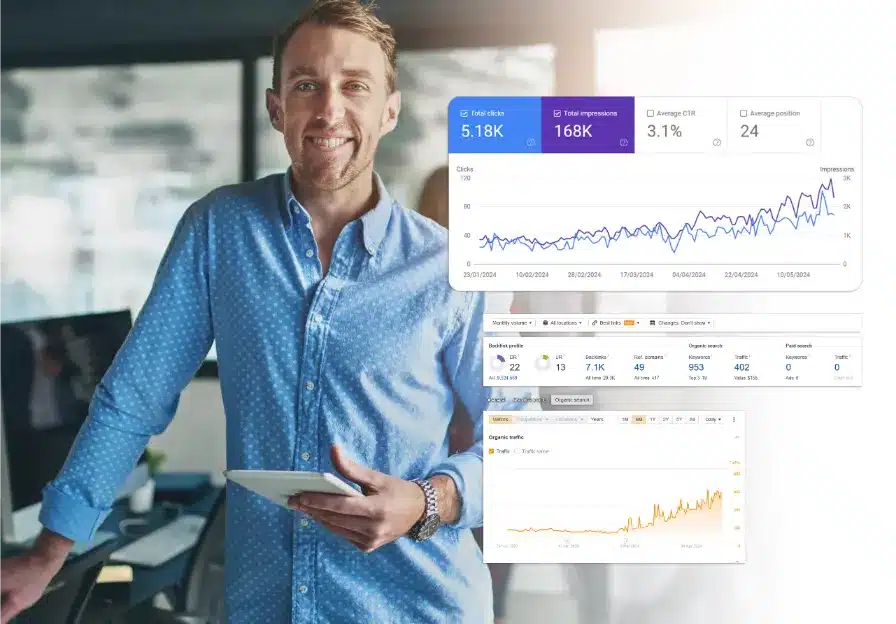Ultimate SEO Effort Guide for Modern Business Growth

Every successful business understands that a strategic SEO effort forms the foundation of digital marketing success. When companies invest in comprehensive search engine optimization, they position themselves to capture valuable organic traffic from potential customers actively searching for their products or services. At Superlewis Solutions, we recognize that an effective SEO effort requires expertise, consistency, and proven strategies that deliver measurable results. Contact our team today to discuss how we can help transform your online presence through targeted optimization techniques.
Understanding the importance of SEO effort begins with recognizing how search behavior has transformed over recent years. Modern consumers rely heavily on search engines to research products, compare services, and make purchasing decisions. This shift means businesses must prioritize their search visibility to remain competitive and accessible to their target audience.
The Foundation of Strategic SEO Effort
Building a successful SEO effort starts with understanding the core components that drive search engine rankings. Search engines use complex algorithms to evaluate websites based on relevance, authority, and user experience factors. These systems analyze content quality, technical performance, and user engagement signals to determine which pages deserve top positions for specific search queries.
Keyword research forms the cornerstone of any effective optimization strategy. This process involves identifying the terms and phrases your target audience uses when searching for solutions you provide. Quality keyword research goes beyond simple search volume analysis to consider user intent, competition levels, and conversion potential. Professional marketers understand that targeting the right keywords can dramatically improve the return on investment from optimization activities.
Content optimization represents another critical element of comprehensive SEO work. This involves crafting valuable, informative content that addresses user needs while incorporating targeted keywords naturally. Effective content optimization balances search engine requirements with user experience, ensuring pages provide genuine value while maintaining strong ranking potential.
Technical Elements That Amplify SEO Effort
Technical optimization often determines whether other SEO activities can achieve their full potential. Website speed, mobile responsiveness, and crawlability directly impact how search engines index and rank content. Sites with technical issues may struggle to rank well regardless of their content quality or optimization techniques.
Site architecture plays a crucial role in supporting optimization goals. Well-structured websites help search engines understand content relationships and hierarchy, improving the chances of achieving strong rankings across multiple pages. Internal linking strategies can distribute authority throughout a site while helping users navigate between related topics and services.
Security and accessibility features also contribute to overall optimization success. Search engines favor websites that provide safe, accessible experiences for all users. Implementing proper security protocols and accessibility standards demonstrates quality and professionalism that search algorithms reward.
Measuring and Tracking SEO Performance
Successful optimization requires ongoing monitoring and analysis to identify what works and what needs improvement. Key performance indicators include organic traffic growth, keyword ranking improvements, and conversion rates from search traffic. These metrics help businesses understand the return on their optimization investment and guide future strategy decisions.
Analytics tools provide valuable insights into user behavior and search performance. Understanding how visitors interact with your site after arriving from search engines helps identify opportunities for improvement and optimization. This data can reveal which pages perform well and which may need additional attention or restructuring.
| SEO Component | Primary Focus | Expected Impact |
|---|---|---|
| Keyword Research | User Intent Analysis | Improved Targeting |
| Content Optimization | Value Creation | Higher Engagement |
| Technical SEO | Site Performance | Better Crawlability |
| Link Building | Authority Development | Increased Rankings |
How Superlewis Solutions Maximizes Your SEO Effort
At Superlewis Solutions, we understand that effective SEO effort requires a comprehensive approach combining technical expertise, content strategy, and ongoing optimization. Our team brings over twenty years of experience in online marketing to help businesses achieve sustainable search engine success. We specialize in creating done-for-you optimization solutions that allow business owners to focus on their core operations while we handle the complexities of search engine marketing.
Our approach begins with thorough keyword research and competitive analysis to identify the most valuable opportunities for your business. We then develop content strategies that target high-intent search terms while providing genuine value to your audience. This includes creating SEO-friendly articles, optimizing existing content, and developing geographically targeted pages that drive local traffic.
The technical aspects of optimization receive equal attention in our comprehensive service packages. We conduct detailed audits to identify and resolve issues that may be limiting your search performance. Our team handles everything from image optimization and alt tag implementation to site speed improvements and mobile responsiveness enhancements. This holistic approach to SEO marketing ensures all elements work together to maximize your online visibility.
We also provide ongoing monitoring and performance tracking to ensure your optimization investment continues delivering results. Regular reporting keeps you informed about ranking improvements, traffic growth, and conversion metrics. Our content creation services complement the technical optimization work by producing high-quality, conversion-focused content that engages visitors and encourages them to take action.
Client success remains our primary focus, which is why we emphasize transparent communication and measurable results. Our team is available to discuss strategy adjustments, answer questions, and provide guidance on how to maximize the impact of your optimization investment. Whether you need comprehensive optimization services or specific support in particular areas, we can customize our service packages to meet your unique requirements and budget.
Advanced Strategies for Long-term SEO Success
Sustainable optimization success requires adapting to algorithm changes and evolving search behaviors. Search engines continuously refine their ranking factors to provide better user experiences, which means optimization strategies must evolve accordingly. Staying current with these changes helps maintain and improve search rankings over time.
Content freshness and regular updates signal to search engines that your website remains active and relevant. This doesn’t mean constantly rewriting existing content, but rather expanding on successful topics, addressing new questions, and providing updated information when circumstances change. Regular content additions and improvements can help maintain strong search positions.
Building topical authority through comprehensive content coverage helps establish your website as a trusted resource in your industry. This involves creating detailed, authoritative content that addresses various aspects of your business area. When search engines recognize your site as an expert source, they’re more likely to rank your content highly for related search terms.
Local Optimization Considerations
Businesses serving specific geographic areas must consider local optimization factors in their overall strategy. This includes optimizing for location-based search terms, maintaining consistent business information across online directories, and creating content that addresses local customer needs and concerns.
Review management and local citations contribute to local search success. Encouraging satisfied customers to leave positive reviews and ensuring your business information appears correctly across various online platforms helps improve local search visibility. These factors become increasingly important for businesses competing in specific geographic markets.
Future Trends and Optimization Opportunities
The optimization landscape continues evolving as new technologies and user behaviors emerge. Voice search optimization represents one growing area of opportunity, as more users rely on voice assistants to find information and services. Optimizing for conversational search queries and featured snippets can help capture this growing traffic segment.
Artificial intelligence and machine learning increasingly influence how search engines evaluate and rank content. Understanding these technological developments helps businesses prepare for future algorithm changes and optimization opportunities. Companies that adapt early to emerging trends often gain competitive advantages in search results.
Mobile-first indexing and user experience signals continue growing in importance. Search engines prioritize websites that provide excellent mobile experiences, fast loading times, and intuitive navigation. Businesses that invest in these user experience improvements often see corresponding improvements in their search rankings and visitor engagement.
Video content and multimedia optimization present additional opportunities for businesses looking to diversify their search presence. Optimizing video content, images, and other multimedia elements can help capture traffic from various search result types including image search, video results, and featured snippets.
Conclusion
A well-executed SEO effort requires strategic planning, technical expertise, and ongoing commitment to optimization best practices. Businesses that invest in comprehensive search engine optimization position themselves to capture valuable organic traffic and compete effectively in their markets. The key lies in understanding that optimization success comes from combining multiple elements including keyword research, content creation, technical optimization, and performance monitoring.
As search engines continue evolving and user behaviors change, maintaining strong search visibility requires adapting strategies and staying current with industry developments. Companies that view optimization as an ongoing investment rather than a one-time project typically achieve better long-term results and sustained competitive advantages.
How will you ensure your SEO effort addresses both current ranking factors and future algorithm changes? What steps can you take to build topical authority while improving user experience across all devices? How might emerging technologies like artificial intelligence and voice search impact your optimization strategy?
Ready to transform your online presence through strategic optimization? Contact Superlewis Solutions today at +1 (800) 343-1604 or through our contact form to discuss how our comprehensive SEO services can help your business achieve sustainable search engine success. Our experienced team is ready to develop a customized optimization strategy that drives targeted traffic and increases conversions for your specific industry and goals.
Transform Your Business
Enter your details (right), along with a brief message and we will reply quickly within 2 business days.
We can also meet in person or by Teams video meeting to discuss SEO marketing and content creation services.
Phone (Toll Free)
+1 (800) 343-1604
Postal Address
Superlewis Solutions Ltd
PO Box 33531, RPO Cottonwood,
Maple Ridge, BC, Canada V4R 0H2










